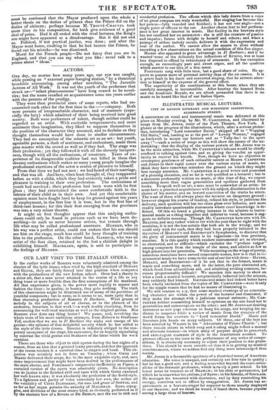ILLUSTRATED MUSICAL LECTURES.
CITY OF LONDON LITERARY AND SCIENTIFIC INSTITUTION, ALDERSOATE STREET.
A DISCOURSE on vocal and instrumental music was delivered at this place on Monday evening, by Mr. W. CARPENTER, and illustrated by songs from Mr. JONES, tenor of the Park Theatre, New York. A glance at the progress of the illustrations, which, after a serious [melee- tion, introducing "Lord remember David," skipped off to " Wapping Old Stairs," and, landing us at the port of " Lovely Woman," engaged us forthwith to mount our hunters and so " Tally-ho ! to the sport away ! "—such a series of songs as this will show the nature of the un- dertaking : that the display of the various powers of Mr. JONES was to be the main attraction, while Mr. CARPENTER'S labours would be chiefly confined to talking against time, and so giving the vocalist an oppor- tunity to recover his breath. Now, though we have no objection to accompany gentlemen of such estimable talents as Messrs. CARPENTER and JONES in their rapid career over the various styles of music, we think they have somewhat mistaken the ground on which they might best occupy attention. Mr. CARPENTER iS a good writer and possessed of a pleasing elocution, and so far is well qualified as a lecturer ; but in a discourse professedly written on music, at this time of day, we expect something more than vague generalities and opnlions gathered from books. To speak well on art, a man must be somewhat of an artist: he must have a practical acquaintance with his subject, discrimination in the choice of his matter, and an inward conviction of the truths he utters. The want of these will always place the lecturer on dangerous ground : however elegant his coarse of reading, refined his style, or judicious his delivery, such qualities will but too often gloss over fallacies, and more readily introduce questionable statements where exact knowledge is de- ficient. Of this we found a glaring instance in the allusion to instru- mental music as a thing imperfect and inferior to vocal, because it sug- gests no definite meaning. Though Mr. CARPENTER here errs with Dr. BEATTIE, and may rather wish to err with the poet than be right with the musician, it is not the less certain that both are in the wrong; and we
could only wish for each, that they had been properly initiated in the
mysteries of MOZART'S and BEETHOVEN'S Symphonies, to discover that the glory of instrumental music is its vagueness—its true province, emotion. It is this quality which renders instrumental art so elevated, so abstracted, and so difficult—which excludes the "profane vulgar" among composers from the temple of the muse, and admits so few as high priests into her penetralia. While mounting on the wings of poetry, numerous musicians have earned respectable names, how is it that in in- strumental music we have come to the end of our list with three—HAYDN, MOZART, and BEETHOVEN—if it be not that in the former, music is music and something more, and in the latter, the pure abstracted art, which freed from adventitious aid, and admitting nothing common, be- comes proportionably difficult? We mention this merely to show on what a rock a musical lecturer, not practically inducted into the science, may suddenly find himself. Instrumental music had indeed better have been wholly excluded from the topics of Mr. CARPENTER—were it only for the simple reason that he had no means of illustrating it.
We will venture to sly, that some musical evenings of an entertain-
ing character are within the power of the lecturer and illustrator, if they make the attempt with a judicious mutual estimate ; Mr. CAR- PENTER neither committing himself to opinions on the one hand nor to generalities and commonplace on the other ; and Mr. JONES not desiring sentences as new pegs whereon to hang his songs, nor keeping his au- :dience in suspense while a review of music from the creation of the world forms the overture to " Lord remember David." Music and literature join hands on many subjects. Of these, one of the best has been selected by WILSON in his " Adventures of Prince Charlie "; but there remain others in which song and reading might reflect a mutual and alternate interest—in which unity of purpose might be preserved, and extravagant contrasts of style in the illustrations avoided. To prevent offence to the taste in the performance of any series of compo- sitions, it is absolutely necessary to adjust their position in due grada- tions. This should be more considered than it is in getting up musical entertainments, where we seldom find any thing more mismanaged than variety. Mr. JONES is a favourable specimen of a theatrical tenor, of American education. His voice is unequal, and certainly not first-rate in quality ; but he has a- good ear, and a feeling somewhat beyond the convention- alities of the dramatic profession, which is rarely a pure school. In his lower notes he reminds us of Ensiles'; in his slide or portamento, (of which he is somewhat too profuse,) of SAPIO ; in his falsetto, of Salaam. He manages his resources with discretion, and by duly controlling his energy, contrives not to offend by exaggeration. Mr. JONES has ac- quirements as a bravura-singer far superior to those usually displayed in our theatres ; and we thick he would, if found there, become popular among a large class of hearers.


























 Previous page
Previous page